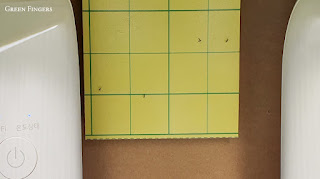When I started growing a variety of basil cultivars, there was one thing I was determined to avoid: Losing them to fungus gnats.
From the very first sowing, I sterilized the soil thoroughly. For watering, I used a solution I call the Druid Elixir—a DIY microbial blend meant to keep the environment clean and resilient.
Despite all that care, one reality remained:
Growing indoors has its limits.
Eventually, the fungus gnats appeared.
At first, I tried to handle it without buying sticky traps.
I made my own.
I glued bright yellow paper onto firm cardboard, then layered double-sided tape on top.
It looked legit. I was hopeful.
So I gave in and ordered proper sticky traps online.
It didn’t take long—by the next day, the traps started to visibly collect gnats.
In the morning? Trapped.
That evening? Even more trapped.
It wasn’t total extermination, but it made a noticeable difference in the air.
The gnats were no longer flying around constantly.
The best part?
My basil stayed healthy.
Here’s what one of the traps looked like after about 45 days.
Yesterday, I replaced it with a fresh one.
It may not sound dramatic, but if you're growing plants indoors, this is a stage you’ll likely face sooner or later.
Looking at the captured gnats, I do suspect there are larvae in the soil.
I could try lifting the soil or applying pesticides, but… I plan to eat these basil leaves eventually.
And since the plants aren't severely damaged, I’ve decided to just manage the situation—not eliminate it completely.
Well, except for one basil that almost died from fertilizer overdose. That was on me.
Even though I’m not 100% gnat-free, I’ve reached a level of balance I can live with.
And the basil leaves?
They look wonderfully healthy.
After all, once you use pesticides, you can’t eat them… right?












